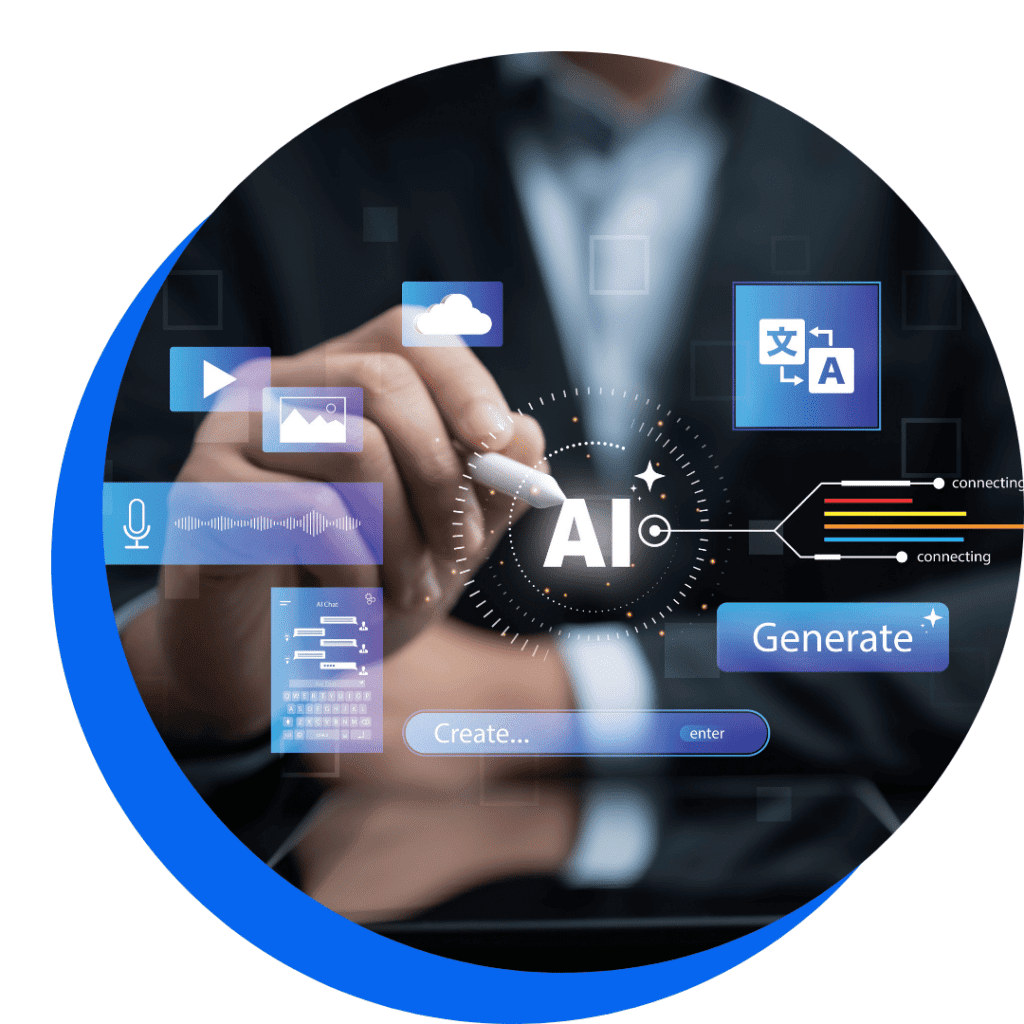Introduction
Artificial intelligence is continually transforming the CX landscape. It turns contact centres from cost-driven, reactive units into forward-thinking hubs that generate consumer loyalty and revenue growth. With AI technological integration, progress and efficiency go hand in hand. Routine tasks are automated, therefore, agents can focus on strategic shopper interactions across channels. As a result, brands deliver exceptional services at scale without costly resource investments. This fosters satisfaction and retention alongside a friendly and inspiring work environment. When AI enhances humans and is embedded effectively, everyone wins. Customers enjoy seamless experiences, employees feel empowered and productive, and businesses gain a competitive edge.
Contact centres operated reactively for decades, addressing incoming issues only after they arose, often through a monochannel approach. This led to inefficiencies and missed chances to build long-lasting relationships, for instance. Today, with AI empowerment, the situation has changed dramatically, expanding the support agent position far beyond simple problem-solving. To clarify, CX teams are transforming into trusted advisors, expertly guiding buyers through their journey. Above all, artificial intelligence makes them fully aware of who customers are, what they need, where their preferred communication touchpoints are, and how to earn loyalty.

The Strategic Value of AI for Businesses
However, while emphasising AI’s benefits, such as agent advancement and process automation, it’s equally important to highlight the technology’s strategic value for the C-level management. These leaders, responsible for contact centre performance and evaluation, make decisions that will shape the future direction and success of the CX initiatives. This is to say, AI solutions provide them with actionable insights that help precisely identify key moments where outcomes matter most. Moreover, they accurately detect deeper shopper needs in real-time, and swiftly uncover areas for improvement. These form the foundation for building a compelling customer experience strategy. By shedding light on opportunities that might otherwise go unnoticed, algorithms deliver knowledge that surpasses the capabilities of traditional tools previously relied upon in consumer services.
Benefits of AI Integration: Statistics That Show AI’s Effectiveness
In short, real-life statistics highlight the advantages of human-AI collaboration, as demonstrated by use cases from Conectys and BlueTweak clients:
Contact centre teams resolve tickets 52% faster with AI than non-AI-empowered CX units.
Incorporating artificial intelligence into CX processes improves customer satisfaction scores by 35%.
AI tools help agents handle 13.8% more inquiries per hour while reducing cognitive overload by 35%.
In addition, AI assistance helps CX employees craft more personalised responses while increasing their productivity by 30-50%.
As a result, AI-driven ticket sorting and routing cuts buyer response time by up to 80%.
Automating language interpretation with AI enables global brands to lower translation-related costs by over 60%.
Exploring the Types of AI in Customer Experience
While AI is often used as a catch-all term, the customer experience landscape is shaped by several distinct types of artificial intelligence. Understanding these categories is crucial for all firms looking to integrate the right innovations into their strategies. Each type plays a unique role in enhancing contact centre efficiency. In the hands of CX managers and human agents, they serve as an extension of their intelligence, perception, and decision-making capabilities.
Projecting the Most Successful Scenarios
At the forefront, Predictive AI forecasts customer behaviour, operational risks, and emerging trends based on historical data and real-time inputs. For example, it can anticipate when a client may require more personalised assistance or predict spikes in service demand, helping to react appropriately and on time and preventing issue escalation.
Getting More with Lower Imput
Generative AI, on the other hand, powers automated, human-like content creation and provides customer support teams with dynamic response and action recommendations. These might include suggesting the next best action during service delivery, allowing the company to increase productivity and accuracy.
Uncovering the Hidden Truth
Meanwhile, Analytical AI uncovers service quality and efficiency patterns by processing large volumes of interactions, including written messages, call transcripts, and chatbot conversations. Deep analysis extracts actionable insights that can be incorporated into business strategy formulation to solve difficulties, close performance gaps, and drive continuous improvement.
By leveraging diverse AI capabilities, whether individually or in combination, brands can elevate their CX initiatives, becoming more agile, consistent, and consumer-centric. Most importantly, they can continuously enhance agent skills, engagement, and motivation, making their role more impactful and prestigious while actively fueling success.
The Power of AI: Agent Skill Sets Redefined
Considering that artificial intelligence is not just a tool but a transformative force reshaping contact centre agents’ roles, it’s worth considering how and when it impacts. One thing is undeniable: CX employees are no longer confined to following scripts or performing repetitive tasks. They are evolving into dynamic problem-solvers, empathetic communicators, and strategic enablers of exceptional customer journeys.
By blending human qualities like empathy, creativity, and adaptability with AI’s analytical power and real-time insights, agents are redefined across four key dimensions. This synergy empowers them to deliver a new category of services that combine personal intuition with cutting-edge technology, fostering an elevated CX. This is how AI is redefining agent skill sets:

1. Multi-Platform Detectives
Today, contact centres are no longer limited to predefined procedures. With AI as their co-pilot, agents now act as “multi-platform detectives,” capable of diagnosing and resolving issues across diverse systems, including APIs, apps, payment gateways, and more, without unnecessary escalations. Technology supports them by alerting pain points, identifying the root cause and providing step-by-step solutions. For example, imagine an e-commerce customer facing an issue with their order status. Instead of bouncing between systems or forwarding the request, an agent equipped with AI can seamlessly access data from the order management system, payment processor, and delivery partner. Within minutes, they diagnose what happened (e.g., a delayed shipment due to weather) and provide an accurate update with actionable next steps without transferring the call.
2. Integration Whisperers
In the age of omnichannel CX, consistency is key—and that’s where agents shine as “integration whisperers”. With AI bridging backend systems like CRMs, SaaS tools, and legacy databases, support teams can ensure smooth data flow across touchpoints while delivering a unified experience. AI empowers them with instant access to relevant information across platforms and the ability to create custom workflows without special IT expertise. Innovative self-healing solutions also work in the background, further strengthening efficiency. Now, visualise a telecom company that uses AI-powered integration tools to unify its CRM with a billing platform and a chatbot system. When a customer calls about a billing discrepancy after interacting with the chatbot earlier, the agent instantly sees the full interaction history, including transcripts. They can provide resolution without asking repetitive questions or transferring departments.
3. Memory Bankers
AI transforms CX agents into “memory bankers,” giving them instant access to years of client history. With a complete view of each customer’s journey, contact centre workers can apply hyper-personalisation. It is about adjusting content, tone, language, and channel to make interactions truly valued by consumers. Whether resolving issues or guiding purchases, nothing important is overlooked. For instance, picture a luxury hotel chain where an AI-powered memory banker enhances the traveller experience. When a repeat guest calls to book a room, the agent immediately knows their preferences (e.g., ocean view), past complaints (e.g., noise issues), and even their favourite welcome drink (e.g., sparkling water). This level of personalisation turns routine transactions into memorable interactions.
4. Crisis Negotiators
Managing difficult customer complaints in high-pressure situations is no longer a CX burden. With data-driven insights, contact centres can quickly identify potential challenges before they even happen on the stage when a buyer is unaware of them. When a problem arises, technology suggests optimal solutions, guiding agents to address concerns swiftly and confidently, increasing the likelihood of a successful resolution and consensus. As an example, envision a travel agency that monitors live calls for signs of frustration (e.g., raised voice or negative language) using sentiment analysis. When an irate passenger complains about a cancelled flight during the peak holiday season, AI delivers humans real-time coaching on how to empathise (“I completely understand how frustrating this must be”) while offering proactive solutions like rebooking on an alternate airline at no extra cost.
Personalisation at Scale
One of the standout benefits of integrating AI into contact centres is its ability to enable personalisation at scale. With so much data available, technology makes it possible to craft tailored experiences, even in high-volume environments. Traditionally, delivering such a level of customisation would require extensive human resources, leading to high costs and inefficiencies.
AI breaks this barrier by automating personalisation while maintaining individual depth and relevance. It can access shopper histories, preferences, and real-time actions, combining this information to create a truly bespoke interaction. Whether recommending products, offering personalised responses, or proactively resolving issues based on past behaviours, AI can quickly scale this highly relevant individual approach across millions of buyers. It is all done with minimal human input and at a fraction of the cost.
AI Deployment: Challenges and Mitigation Solutions
With all its benefits to the CX industry, artificial intelligence continues to revolutionise an increasing number of contact centres. At the same time, businesses must navigate a series of challenges to harness their transformative potential fully. Ultimately, the goal is to ensure that the tools companies choose and implement serve their intended purpose rather than falling short or undermining customer trust and satisfaction.
Creating a Friendly Environment
One of the primary hurdles is ethical deployment. AI systems can inadvertently reinforce biases in their training data, leading to unfair outcomes, such as favouring specific demographics. This risks eroding consumer loyalty and damaging brand reputation. To mitigate this, organisations must audit datasets for diversity, rigorously test algorithms for fairness, and implement human oversight to ensure ethical decision-making. Further, openness is equally crucial. Companies should inform customers when AI is involved and explain their decisions to foster confidence.
Safeguarding Sensitive Information
Data privacy presents another critical issue, as AI relies on vast amounts of sensitive customer information. Without strong safeguards, companies face risks of data breaches and non-compliance with regulations like GDPR or CCPA. Firms must embed privacy-by-design principles into their AI systems, employ robust encryption and anonymisation techniques, and establish multi-layered cybersecurity frameworks to address this. Real-time threat monitoring and secure access controls are essential to prevent malicious interference that could compromise AI’s effectiveness.
Preventing AI Hallucinations
Then, accuracy and precision are also key concerns, particularly with generative AI models that may produce misleading outputs or “hallucinations.” Such inaccuracies can result in misinformation or flawed decision-making. Regular updates and retraining of AI models with fresh data are vital to maintaining relevance and precision. Additionally, implementing escalation triggers ensures that complex or ambiguous queries are seamlessly handed off to human agents for resolution.

Balancing Human Impact and AI Strength
Additionally, human-AI collaboration forms the backbone of successful AI integration in contact centres. While technology excels at automating routine tasks and providing real-time insights, it cannot replicate the empathy required for emotionally sensitive interactions. Clear escalation protocols and smooth transitions between AI systems and CX teams are essential for maintaining continuity and customer satisfaction. Upskilling programs enhance this collaboration by enabling agents to handle higher-value tasks requiring creativity or emotional intelligence.
Being Helpful and Honest
Finally, transparency about AI’s limitations and proactive communication regarding its role in customer interactions are pivotal for building trust. Companies must also align AI initiatives with overarching business objectives to ensure measurable returns on investment. By addressing these challenges through ethical governance, robust security measures, continuous improvement, and a focus on human-AI synergy, organisations can harness the transformative potential of artificial intelligence while delivering exceptional customer experiences.
Data Labeling and Annotation: The Backbone of AI-Driven Contact Centers
Data labelling and annotation are essential for developing reliable and effective AI systems in contact centres. They transform raw data, such as call transcripts, chat logs, and customer feedback, into structured, machine-readable formats that AI can recognise, understand, interpret, and contextualise. In essence, these processes aim to teach artificial intelligence to interpret human intent and nuances, enabling smarter decision-making. They also tackle key challenges like bias, fairness, and accuracy, ensuring that AI operates ethically and delivers meaningful results.
Whether Predictive AI forecasts consumer needs, Generative AI powers chatbots, or Analytical AI extracts insights, precisely labelled data guarantees outputs are relevant, coherent, and aligned with user expectations.
AI Types and the Impact of Data Accuracy
Predictive AI relies on accurately labelled historical data to identify trends like buyer churn risks or peak support times. Without precise tagging, models may fail to distinguish between routine inquiries and complaints, leading to flawed forecasts and ineffective business strategies.
Generative AI systems like chatbots and virtual assistants depend on annotated datasets to generate coherent and context-aware responses. Mislabelling can result in errors like offering incorrect solutions or failing to recognise industry-specific terminology, damaging brand reputation.
Generative AI systems like chatbots and virtual assistants depend on annotated datasets to generate coherent and context-aware responses. Mislabelling can result in errors like offering incorrect solutions or failing to recognise industry-specific terminology, damaging brand reputation.
Severe Consequences: When AI doesn’t understand your intentions
It is also important to highlight the significant risks of poorly defined and classified data, which can result in a cascade of negative consequences. These include reputational damage, legal liabilities, regulatory penalties for non-compliance with privacy laws like GDPR, lost sales, and costly corrections. Ensuring high-quality labelling and annotation are essential to preventing errors and their implications, safeguarding cybersecurity, maintaining ethical standards, and improving AI model performance.
Conclusion
In conclusion, artificial intelligence is transforming contact centres, with its presence set to expand further. As a key driver, it enhances human capabilities and enables increasingly natural self-service experiences, boosting efficiency, personalisation, and scalability across operations and customer interactions. However, its success hinges on the quality of data and training it receives to navigate challenges and reduce risks that could undermine its value. Data labelling and annotation are critical to empower algorithms’ reliability and effectiveness alongside increased security measures and compliance.

Future-Proofing Contact Centers with AI
Consequently, future-proofing roles will be essential. It is about reskilling for AI-augmented workflows, establishing career paths in AI oversight and strategy, and evolving KPIs to measure the success of hybrid teams. Ultimately, the AI revolution will continue, driven by clear ROI, significant cost savings, and unparalleled advancements, with businesses increasingly embedding the technology into their CX strategies.
A 2023 Gartner study showed that 80% of companies use AI to improve customer experience.
According to MarketsandMarkets, the call centre AI market is projected to reach $4.1 billion by 2027, growing at a CAGR of 21.3%.
According to KPMG, businesses see an average return of $3.50 for every $1 invested in AI, with 5% of companies reporting a return of $8.



















